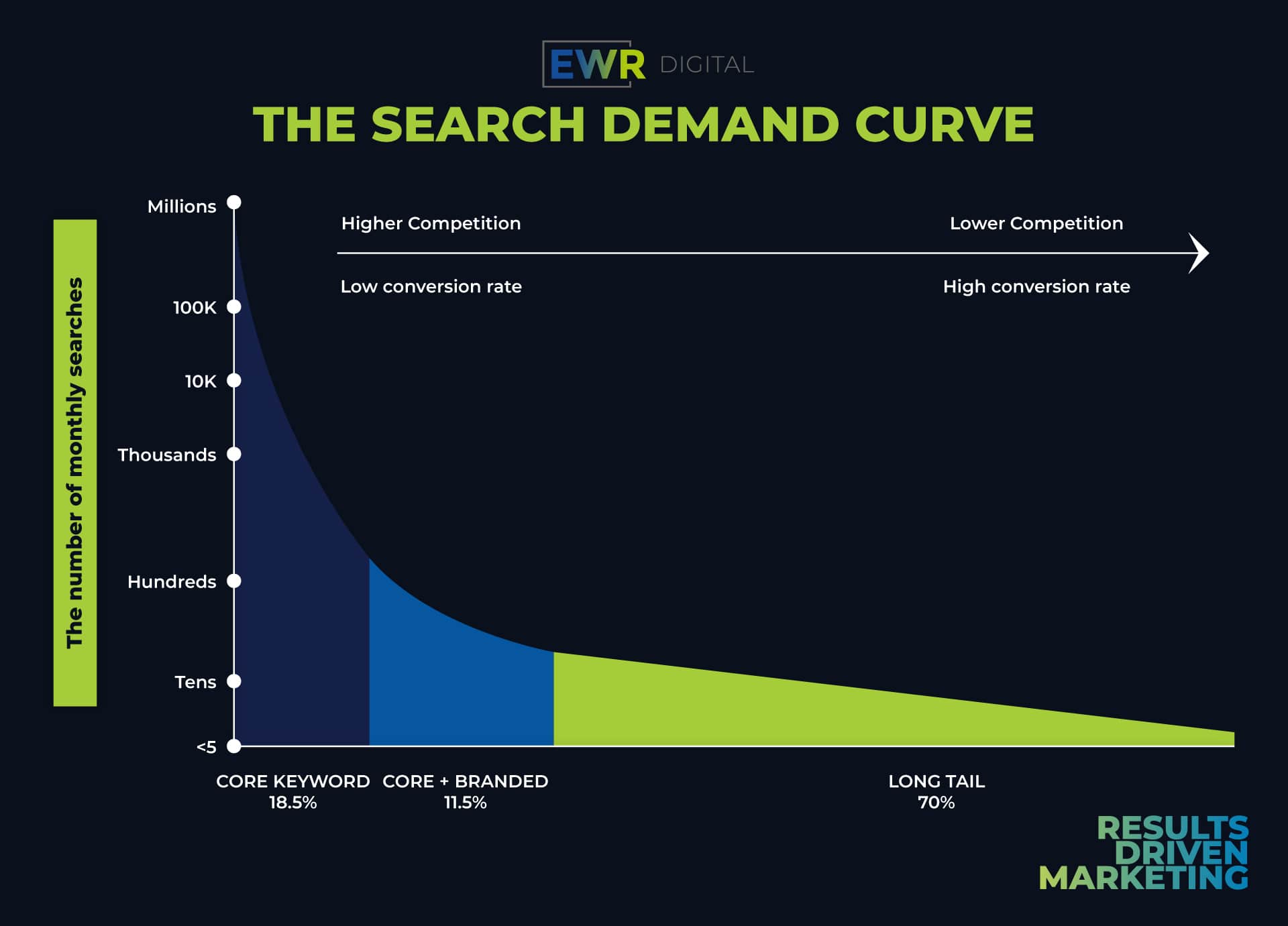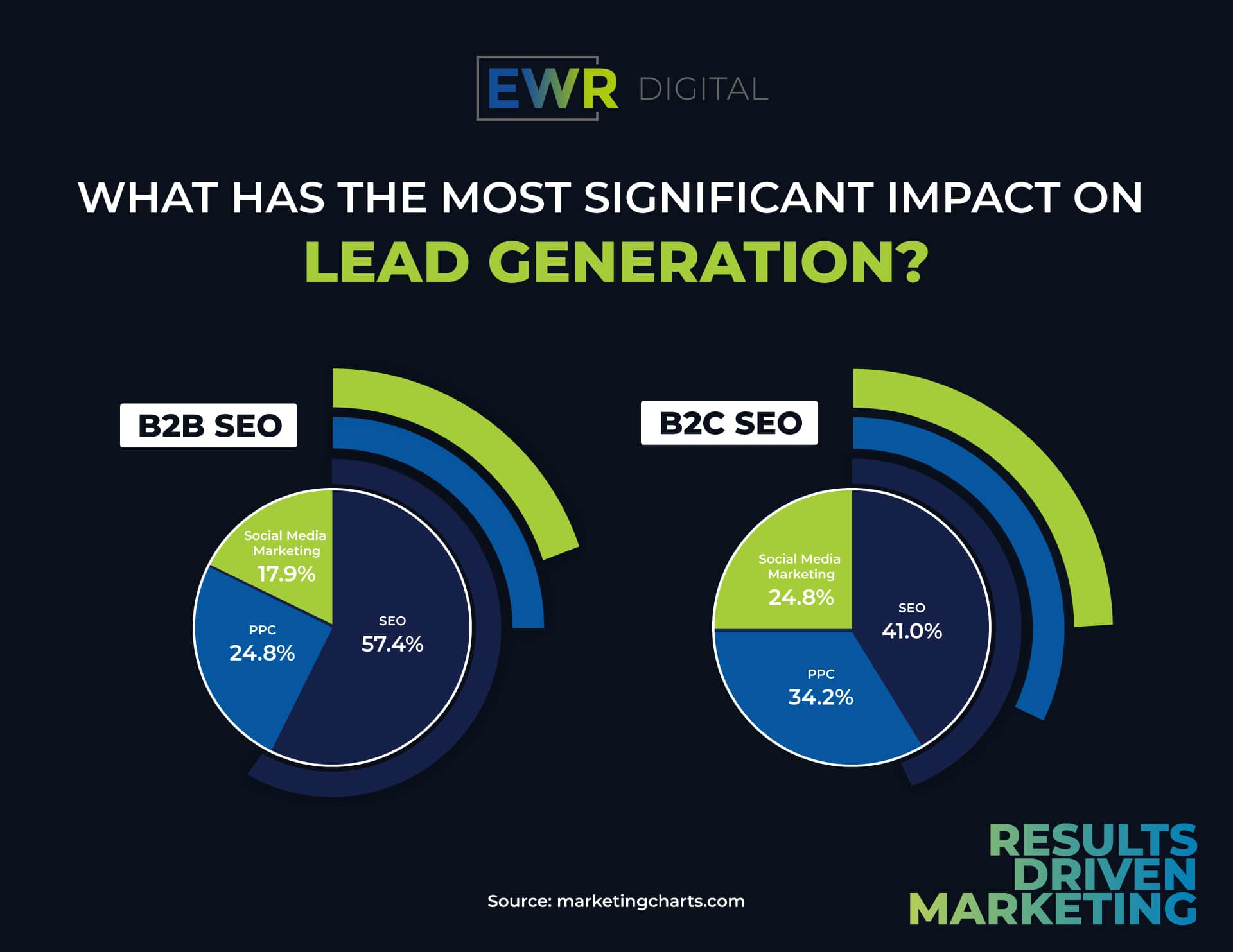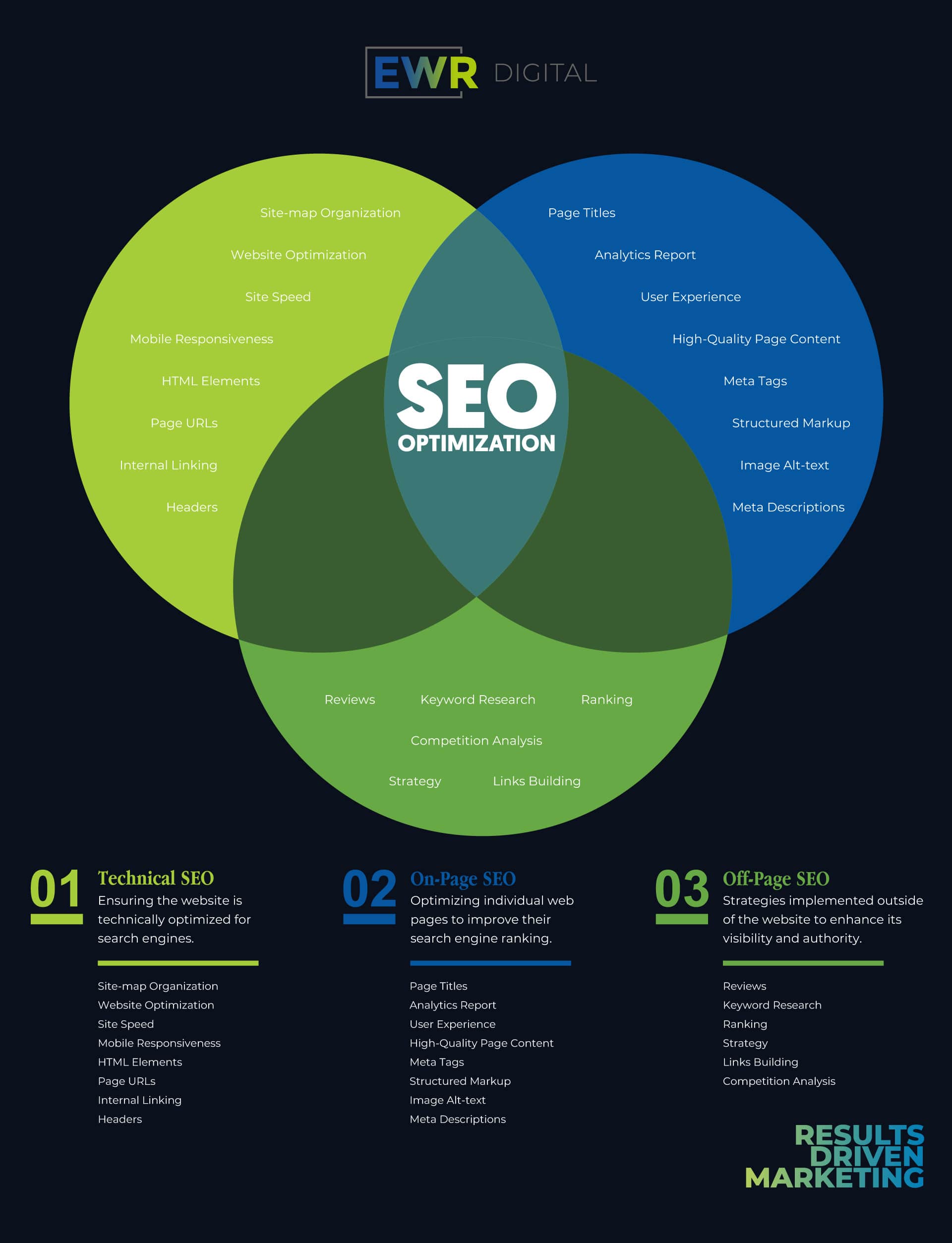
How does B2B SEO strategy differ from regular SEO?
When it comes to ranking your B2B company website for the top keywords in your space there are a number of things to consider. In this article we’ll outline some of the important things you need to keep in mind when mapping out your B2B SEO strategy.
Organic web traffic from Google is the top source of new customers for most companies. Search engine optimization (SEO) is the practice of improving the visibility and ranking of a website or online content in search engine results pages (SERPs). Traditional SEO typically targets a general consumer level audience and typically employs a broad set of keywords, while B2B SEO focuses on optimizing content for a specific business-to-business (B2B) audience, which is often a much narrower target to hit. In contrast to regular SEO, B2B SEO requires a considered approach that focuses on the specific needs and priorities of B2B buyers, and takes into account the way buyers research and select products and services.
To get in front of B2B buyers during the research phase, effective B2B SEO strategies focus on industry-specific keywords, and include targeted content that addresses the unique pain points of B2B buyers. By using smart B2B SEO strategies that speak to these issues, businesses can effectively connect with potential customers at every stage of the buyer’s journey, establish themselves as thought leaders in their industry, and ultimately drive more leads and revenue.
Keys to a Successful B2B SEO Campaign:
Know Your Audience (Hint – Ask your sales team).
Identify target industries and audiences: B2B SEO requires a deep understanding of the target industry and audience. This involves identifying specific industries, niches, and job titles that are relevant to the business. It also requires the engagement of multiple stakeholders across a business. Customer facing team members like sales and customer service, are best positioned to understand the needs and decision processes of customers. It is essential for content creators to engage with front line teams who can help direct the creation of content, so that it will speak directly to customers.
Industry-Specific Keywords
B2B SEO requires targeting industry-specific keywords that are relevant to the target audience. These keywords may differ from regular consumer keywords and require research to identify. With most industries there is still a lot of untapped potential for ranking for specific keywords that have not yet been well served by the content that is created. If you have internal expertise at your company that speaks to the needs of your customers, there is a great opportunity to create expert level content that will get your site ranking for searches coming from your target audience.

Beware of B2C Keyword Overlap
It’s not always the case, but in some situations, there may be consumer level versions of a product that compete for keyword positions with industrial level products. For instance, you can buy a wood chipper, a robot, or a ball valve for personal use, but there are industrial versions of these product categories that are exclusively for commercial or industrial use. Consumer level versions of these products are usually smaller and/or less robust. These wording distinctions are really critical when it comes to B2B PPC advertising, but are also important when it comes to what search terms you try to rank for in your B2B SEO efforts. Using keyword modifiers that differentiate these audiences, such as “industrial” or “commercial” can be an effective way to sidestep this audience keyword overlap.
Corporate vs. Customer Language
Sometimes people at the head office use more formal technical terminology that isn’t commonly used by their customers. The formal terminology of head office often gives way to more casual forms of speech in the field. Understanding and leveraging this difference can be a critical factor in B2B SEO. When potential customers are searching, they will often use the more casual language. For example: the keyword “safety footwear” has about 500 monthly searches, but the term “work boots” has more than 100,000 monthly searches. When laying out a website, you should at least consider the language that your audience uses to speak about your products. Is it more important to sound formal (sometimes it is) or more important to rank for industry specific language? When compromise is necessary, sometimes the company blog can serve as a place to rank for these informal sounding keywords.
Address Relevant Concerns
B2B buyers have unique pain points and challenges that differ from regular consumers. Developing targeted content that addresses these specific pain points is essential to successful B2B SEO. Is there a specific problem that people are trying to solve? Are they aware of the solution that you are offering? Are they currently solving that problem in a different way? With newer offerings, you may need to spend time educating your audience and creating awareness around a product or service.
Case studies and whitepapers
B2B buyers rely heavily on research and data when making purchasing decisions. Creating case studies and whitepapers that showcase your business’s expertise and sharing customer success stories can help establish credibility and build trust with potential buyers. Good case studies can serve as lead magnets (as in, give us your email address and we’ll give you our white paper) if the content is compelling enough. Price lists, which companies are often reluctant to share directly on their website for competitive reasons, are probably the simplest form of lead magnet. Anyone who’s looking for pricing information is likely further down the decision path than someone searching for a solution using purely problem based terms. It’s important to create content for users at each stage of the buyer’s journey. No one likes to be sold to aggressively up front, but when customers are in the research phase, they need information that will help them make effective business decisions. Focus on creating content that helps them during that process. The question of whether or not to show the pricing on the website is always a delicate one, and different stakeholders in an organization will have varying opinions. With that said, having clear easy to understand pricing information available can help you rank your site for price based searches. Showing your pricing is often considered more direct and more helpful as well. Who really wants to sign up for another sales pitch, right?

Leverage Social Media for B2B Networking
Social media platforms such as LinkedIn are crucial for B2B networking and lead generation. They also serve as promotional channels for getting exposure for any new content that you have created. This is a contributing factor in B2B SEO because Google views active engagement with your content as a ranking signal. If no one knows about your article, that engagement can’t happen. Developing a strong social media presence and engaging with other businesses in the industry can help build relationships and awareness, both of which contribute to the creation of new customers over time.
Smart B2B Linking Strategy
B2B SEO requires a strong link building strategy that targets relevant industry publications and websites. Building links from credible sources can improve search engine rankings and drive referral traffic. Google views backlinks as a vote of confidence in your content. The higher the domain authority of the linking website, the better. Low quality links from websites that lack authority are sometimes worse than useless and can actually have a negative impact on your search engine rankings.
Optimize for Long-Tail Keywords
B2B buyers often search for specific products or solutions using long-tail keywords (specific searches with more words). Optimizing for these long-tail keywords can improve search engine visibility and drive more targeted traffic to the website.
Follow-Up is Essential
This one isn’t strictly about SEO, but it’s important to understand that SEO is only one facet of a well rounded B2B marketing strategy. If you’ve expended the time and effort to bring people to your website. Once B2B buyers typically require more time and information before making a purchasing decision. If they’ve visited your website once, you can remind them of your offerings by using specific follow up tactics like remarketing ads [those ads that follow you around on various sites]. Most major digital ad platforms offer some kind of remarketing ads. If they’ve gone so far as to give you their email address there are a number of follow up techniques that can be effective. Developing a lead nurturing strategy that includes email marketing, retargeting (another word for remarketing), and other tactics can help nurture leads and convert them into customers. Be sure to have a robust privacy statement in place that outlines the specific ways that your company may use collected customer data and comply with whatever local regulations may exist.
Speak to Decision Influencers at All Levels
To effectively engage with the different levels of audience within the organizations they are targeting, B2B service firms must communicate in a language that their customers commonly use. It is important to understand the unique challenges and pain points of each audience level to tailor the content and messaging appropriately. B2B service firms can gain insights into customer needs and pain points by leveraging the knowledge and expertise of their customer service and sales teams. By working closely with these teams, B2B service firms can develop a better understanding of their customers’ needs and challenges and use that information to develop more targeted content and messaging. For example, in the construction and manufacturing industries, where different stakeholders such as architects, engineers, subcontractors, quality control managers, and production managers may all be involved in the decision-making process, it is crucial to understand the specific accountabilities of each group within their larger organization. By communicating with each group in a language they commonly use and addressing their unique challenges, B2B service firms can increase their chances of successfully reaching their target customers during the consideration and research phase of the buying process.
Play the Long Game
B2B search rankings aren’t gained in days or weeks, they are built over time by creating a steady flow of new, interesting, relevant content that connects with your customers. It’s wise to create a process for the production of strong B2B SEO marketing content that continually adds to your domain authority and gets you ranking for a variety of terms that are important to your industry. A seasoned B2B SEO agency like EWR Digital can help you create a roadmap and a content plan for how to rank your company website on Google. If you’re interested in creating a content strategy that will help your website get ranking and increase the amount of on-target visitors to your website.

